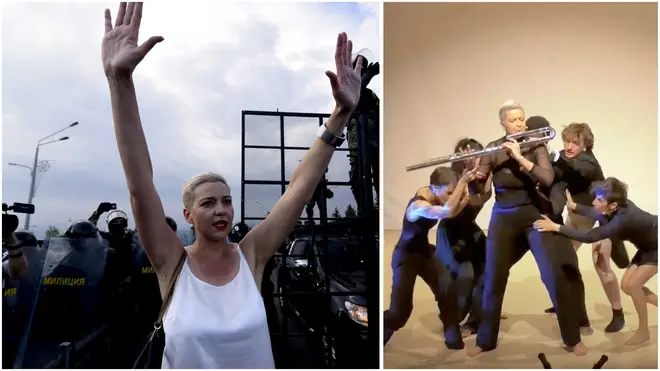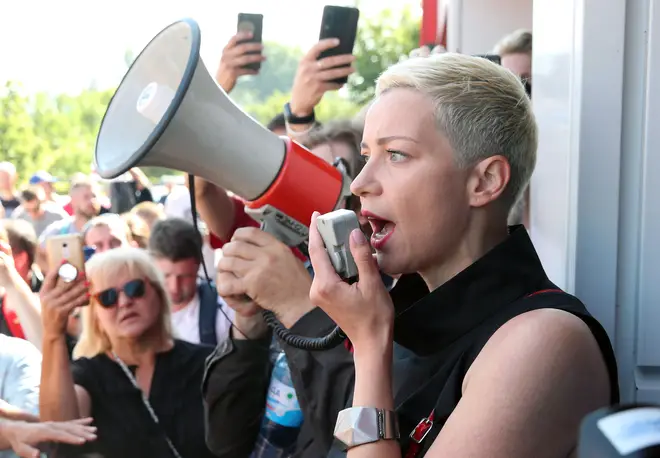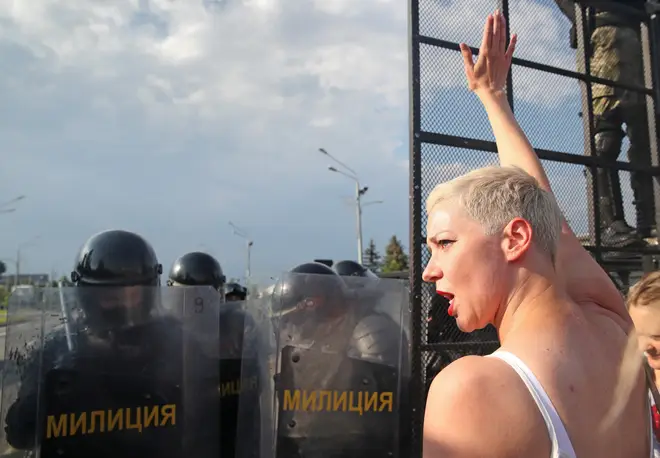On Air Now
Early Breakfast with Lucy Coward 4am - 7am
25 September 2020, 17:24

How music and art shaped the outlook of one of today’s most prominent political activists.
On 7 September 2020, masked men snatched 38-year-old Maria Kolesnikova from a street in the centre of Minsk, the capital of the Eastern European country of Belarus, and bundled her into the back of a minivan.
She was driven to the Ukrainian border, where it was reported, she deliberately ripped up her passport to prevent her from being forced to leave her own country.
Kolesnikova is a leading Belarusian opposition figure and part of a group of high-profile political activists calling for the resignation of Alexander Lukashenko after 26 years as president. Lukashenko’s victory in an August poll was widely seen as rigged and sparked mass protests and strikes throughout the country.
Read more: Music in protest: 9 powerful images of music’s role in times of conflict >

Over the last few weeks, she’s become one of the most widely talked about and compelling political activists in the world. She also has an incredible background as a musician, arts leader and teacher.
Kolesnikova was born in Belarus. She studied music in Minsk and played flute in the National Academic Concert Orchestra of the Republic of Belarus. At the age of 25 she went to study at the Stuttgart University of Music where she completed a double major in early music and contemporary music.
Read more: Sir Keir Starmer plays recorder and piano, and was a Guildhall music scholar >
In addition to her studies, Kolesnikova conducted a vocal ensemble and performed in a number of chamber ensembles that specialised in contemporary music.
She also got involved in mixed-media performances like the one below, described as “a music and dance performance for three dancers and three musicians about power and freedom.” You can catch some powerful bass-flute and dance from just over one minute in.

noVOICE - noBODY, a music and dance performance
Kolesnikova’s solo flute repertoire at the time included works by Luciano Berio, Brian Ferneyhough and many other living composers.
She taught music and worked behind the scenes, as project manager of the Artempfestival in Minsk, which showcased new music and contemporary art. In 2019, she served as the art director of the OK16 culture club in Minsk.
In 2017, Kolesnikova organized an event called Music and Politics as part of Minsk’s Night of Museums and gave a lecture about Beethoven and Pussy Riot, the Russian feminist punk group, known for their political protests.
A friend of hers, banker and arts patron Viktor Babaryko, attempted to stand for president of Belarus against Lukashenko. Kolesnikova became his campaign manager, but Babaryko later was jailed and barred from running in the election. Kolesnikova then joined Veronika Tsepkalo and Svetlana Tikhanovskaya in a group that would become the country’s most prominent opposition activists.
In the lead-up to the vote, they were likened to “a female rock band”.
Since the disputed vote and unrest, Tikhanovskaya has been forced into exile, and Kolesnikova has been charged by authorities, but their fight still goes on.

In a 2017 interview, Kolesnikova spoke about music and the world. How music, politics and identity intersect, and the benefits of music’s interconnected and global society.
“The world is becoming very open and moving away from conservatism, there is an exchange of ideas not only between teachers and students but also globally,” she said. “For example, I can write on Facebook to an American composer, whose work I heard on Youtube, ask him to send me notes to perform – and in 15 minutes they are in my hands. Globalisation is a very big plus for art.”
She also spoke in support of equality at the podium. “It is clear that the situation is changing as a critical mass of active women [conductors] accumulates,” she said.
Belarus faces a deep and ongoing political and social reckoning. Themes of equality, empowerment and a global outlook once shone through in Kolesnikova’s approach to music and art. They are now becoming known to the world and are helping shape the history and society of the Eastern European country.